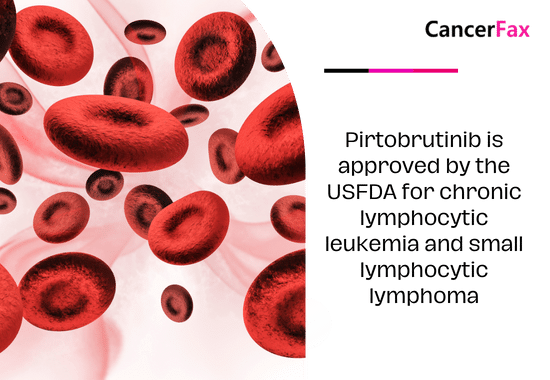The Food and Drug Administration granted accelerated approval to pirtobrutinib (Jaypirca, Eli Lilly and Company) on December 1, 2023, for adults with chronic lymphocytic leukemia or small lymphocytic lymphoma (CLL/SLL) who have undergone at least two prior lines of therapy, including a BTK inhibitor and a BCL-2 inhibitor.
The study looked at how well it worked in BRUIN (NCT03740529), a worldwide, open-label, single-arm, multicohort trial with 108 people who had CLL or SLL and had already had at least two other treatments, including a BTK inhibitor and a BCL-2 inhibitor. Patients underwent a median of 5 previous lines of therapy, with a range from 2 to 11. Seventy-seven percent of patients stopped using the previous BTK inhibitor due to refractory or worsening illness. The drug Pirtobrutinib was given orally at a dosage of 200 mg once a day and was maintained until disease progression or unacceptable toxicity occurred.
The primary efficacy metrics were the overall response rate (ORR) and duration of response (DOR), evaluated by an independent review committee based on the 2018 iwCLL criteria. The objective response rate (ORR) was 72% with a 95% confidence interval (CI) of 63% to 80%, and the median duration of response (DOR) was 12.2 months with a 95% CI of 9.3 to 14.7. All responses were incomplete.
The most frequent side effects (≥ 20%), not including laboratory-related terms, were fatigue, bruises, cough, musculoskeletal discomfort, COVID-19, diarrhea, pneumonia, stomach pain, dyspnea, bleeding, edema, nausea, pyrexia, and headache. Grade 3 or 4 laboratory abnormalities affecting more than 10% of patients included reduced neutrophil counts, anemia, and decreased platelet counts. 32% of patients experienced severe infections, with fatal infections reported in 10% of cases. The prescribing material include cautions and advisories for infections, bleeding, cytopenias, cardiac arrhythmias, and subsequent primary cancers.
The suggested pirtobrutinib dosage is 200 mg taken orally once a day until disease progression or intolerable effects.

Targeting FGFR4 and CD276 with CAR T-cells demonstrates a strong antitumor impact against children rhabdomyosarcoma
Chimeric antigen receptor (CAR) T-cells that specifically target Fibroblast Growth Factor Receptor 4 (FGFR4), a surface tyrosine receptor that is extensively expressed in rhabdomyosarcoma (RMS), are now undergoing clinical research. However, the effectiveness of these CAR T-cells may be hindered by tumor heterogeneity and inadequate activation. In this study, we present a method to enhance the co-stimulatory and targeting characteristics of a FGFR4 CAR through an optimization process. We substituted the hinge and transmembrane domain of CD8 as well as the 4-1BB co-stimulatory domain with the corresponding domains of CD28. The CARs produced exhibit heightened anti-tumor efficacy in multiple RMS xenograft models, with the exception of the RMS559 cell line, which is known for its aggressive nature.

